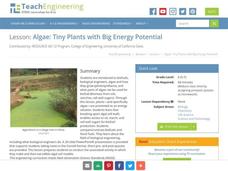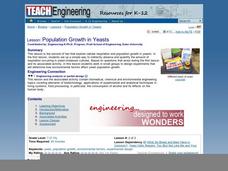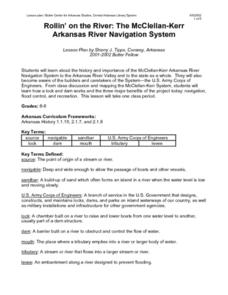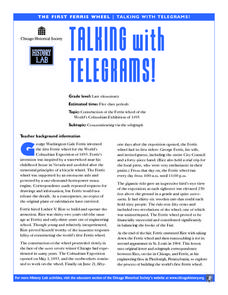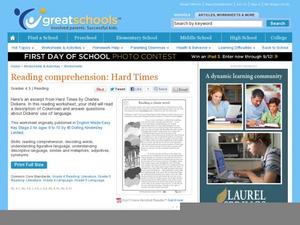Teach Engineering
Active and Passive Transport: Red Rover Send Particles Over
I can move about freely, but you cannot. The class models the movement through cell membranes by way of passive and active transport. Members of the class play the roles of various proteins, atoms, compounds, and cell actions and mimic...
Teach Engineering
Algae: Tiny Plants with Big Energy Potential
My, what big energy potential you have! Scholars learn about the energy potential of using algae as a biofuel. A PowerPoint presentation first describes the structure of algae and then how researchers use algae as biofuel to produce energy.
Curated OER
Moebius Strips
Students make Moebius strips and use them to demonstrate the interconnectedness of an environment. They explore the natural cycles (water, oxygen/carbon dioxide, carbon, nitrogen) within the environment. They describe how the cycles are...
Institute of Electrical and Electronics Engineers
Water Rocket Launch
How do rockets fly? Teams design, build, and launch a rocket made from a two-liter bottle to explore forces on a rocket such as Newton's Laws of Motion. During the design phase, young engineers draw a diagram of their rocket and...
Curated OER
Erosion... Can You Fight It?
Students study erosion and its effects on shorelines. In this erosion lesson, students work in an engineering team to design a seawall and submit a cost bid to their teacher. Students must determine the energy of a wave and design a wall...
Curated OER
Population Growth in Yeasts
Students design an investigation using yeast. In this environmental engineering activity, students design an investigation to determine how environmental factors affect the growth of yeast. They will collect quantitative data and discuss...
Curated OER
Rollin' on the River: The McClellan-Kerr Arkansas River Navigation System
Middle schoolers take a close look at the McClellan-Kerr Arkansas River Navigation system. They study how the Army Corps of Engineers built and monitor the system. Learners discover how a lock and a dam work, and study three benefits of...
Curated OER
Building Your Space Station
High schoolers discuss the benefits of the International Space Station. They evaluate the challenges the designers faced when trying to design the space station. Students discuss the use of scale models when designing large structures...
University of Minnesota
Dendritic Spines Lab
This is your brain on drugs ... literally! Your neuroscientists-in-training examine the evidence of drug use on the human brain and how neurons change their connectivity when altered by drugs. They then work together to create testing...
EngageNY
TASC Transition Curriculum: Workshop 9
Here's a workshop for teachers that rocks the academic world! Using earthquakes as a medium for instruction, educators learn about crosscutting engineering with science. Fun, hands-on, collaborative exercises encourage participants to...
Workforce Solutions
Egg-streme Sports
Here's a new twist in the egg drop competition. Using only six inches of tape, four straws, and 2 pieces of newspaper, teams build a structure that keeps an egg from breaking when dropped. What's different about this project is that the...
Virginia Department of Education
Building a DNA Model
It has been decades since the discovery of DNA. Still, activities such building this DNA model allow blossoming scientists to better understand the components that form this overall structure. During this activity, they will also...
Workforce Solutions
Egg-streme Sports
Challenge small groups to build a structure that catches a raw egg without breaking—working collaboratively and applying mathematical and engineering principles. Pretending the frame was made by a business, scholars create a marketing...
Curated OER
Telegrams!
Students read and analyze original telegrams to learn about people involved in and process of building the world's first Ferris wheel, examine correspondence between inventor and engineer to understand planning necessary to build Ferris...
Perkins School for the Blind
Identifying and Using Tools
How can you teach a person about technology and engineering if he has never been exposed to the tools and devices used to create and construct? Learners with visual impairments examine a number of common tools, such as hammers, wrenches,...
Teach Engineering
Who Can Make the Best Coordinate System?
Working with a map that does not have a coordinate system on it, small, collaborative teams must come up with a coordinate system for their map. Groups then explain their coordinate structure to the class.
Curated OER
Paper Suspension Bridges: You Want Me To Go Up There?
A few class periods will be required to complete this physics investigation with your high schoolers. There is an unavailable video written into the lesson plan, but there is plenty of material here to bridge the gap. Two terrific...
Agriculture in the Classroom
Design 'Y'er Genes
How do changes in DNA affect an organism? Scholars explore chromosomes, genes, DNA, and mutations by modeling the DNA of a strawberry. They build a DNA model, then manipulate it to show how changing the genes transforms the strawberry...
Curated OER
CELL TRANSFORMATION IN TOBACCO LEAF DISKS
Students work with whole plant material and are not required to measure small quantities, yet they can see evidence of transformed plant cells (plant cells that have genes from bacterial plasmids). This is a laboratory suitable for...
Curated OER
Energy Resources: Where Are They and How Do We Get Them?
Future energy engineers visit several stations, each one dedicated to a different alternative source of energy. They describe how solar energy is converted into other forms of energy, the patterns of distribution of energy resources in...
Curated OER
Reading Comprehension 6: Level 9
Did you know that an acre of trees can absorb as much carbon dioxide as a car emits in 11,000 miles of driving? Such fun facts abound in a short reading comprehension passage detailing the benefits of parks and rooftop gardens. After...
Curated OER
Reading a Classic Novel
Charles Dickens offers an excellent example of sensory writing in this reading comprehension instructional activity. Learners read excerpts from the novel Hard Times in which he describes the New England industrial city of...
Curated OER
The Design of Fort McHenry: The Star Fort
What makes an effective fort, and why might a city feel that they need such a structure? Your young historians will explore the purpose and design for Fort McHenry, and build their own models of a fort based on the information they...
Messenger Education
Star Power! Discovering the Power of Sunlight
It takes less than 10 minutes for energy from the sun to travel 90 million miles to Earth! In the first installment in a series of four, groups measure the amount of solar radiation that reaches Earth. They then discuss how this is...



